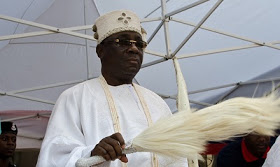
The Oba of Lagos, Rilwan Akiolu, has blamed President Muhammadu Buhari for the lacuna in the operations of the Nigeria Police Force.
Akiolu said that the military government under Buhari between 1983 and 1985 was not committed to the funding of the police, thinking there was a conspiracy in the Force against the regime.
The monarch, however, charged the 74-year-old President to address the challenges hindering the effectiveness of the police “now that he has come back as a democrat.”
Akiolu, a retired Assistant Inspector-General of Police, spoke on Friday at a seminar in Lagos, tagged: ‘Providing Strategic Solutions to Emergent Security Challenges: The Essentials of Synergy Amongst Security Agencies and Civil Populace.’ The seminar was organised by the Inspector General of Police, Ibrahim Idris.
He said, “The military killed the efficiency and effectiveness of the Nigeria Police Force. The problem of the police started with Buhari in 1984 when he was Head of State. They said (Sunday) Adewusi wanted to take over the government. I explained to them that it was not possible at all.
“There was a meeting sometime ago in Abuja where all of us were summoned. I was very happy when Buhari told us that 10,000 policemen would be recruited for efficiency and effectiveness of the Nigeria Police Force.”
Akiolu, who did not explain those he referred to as “they,” said he also advised a former Head of State, Gen. Abdulsalam Abubakar, in 1997 on the need to create sufficient police stations on expressways to tackle highway robberies.
He said, “What he (Abubakar) told me was that ‘Commissioner, do you want me to commit all the resources of the government to the police alone?’”
A former IG, Musiliu Smith, lamented that most policemen were ill-trained as a result of poor funding, urging that competent officers should be entrusted with sensitive positions without recourse to religion or ethnicity.
Smith said, “Please give appropriate attention to the issue of training. Another issue is infrastructure. A lot of ghettos in the country are areas that vicious criminals hide and police cannot go there because there are no access roads.
“We also have to make a strong case to the government on the issue of barracks. As long as we don’t have 50 per cent of police personnel within the barracks, you will never be able to respond promptly to emergencies.
“Some of the policemen living outside the barracks are attendants to criminals, who give them free accommodation. Right now, 25 per cent of personnel is in the barracks all over the country.”
Another retired IG, Sunday Ehindero, called for mutual intelligence sharing among security agencies, noting that different strategies must be adopted to solve the dynamics of crimes.
Guest speaker of the occasion, Etannibi Alemika, a professor of criminology at the University of Jos, emphasised the need for effective community policing.
He said, “You are not going to have security by abusing the police. There should be a partnership between the community and the police in terms of intelligence gathering while the debate of state police is ongoing.”






